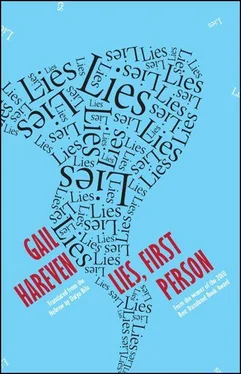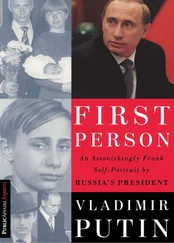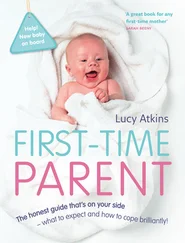Gail Hareven
Lies, First Person
PROLOGUEYou should never believe writers, even when they pretend to be telling the truth. Everything that’s written here is pure fiction
My husband urged me to make this clear at the outset if I intended to tell this story. The version he proposed was somewhat different, as a matter of fact very different, but in any case I promised him to write this introduction.
My husband Oded is a lawyer. He adores me, our children, and our way of life; and I, who love and respect him profoundly, am ready to accept his advice. And to dispose of any doubt let me stress:
None of the characters that appear here, myself included, are real. The first person is not my person, and the events recorded here never happened to me or to anyone I know.
The truth is that nothing bad was done to anyone, and I did nothing bad, and I was always as quiet as a mouse.
In short, the truth is that nothing happened at all.
Perhaps it only could have happened.
BOOK ONE.THE GARDEN OF EDEN AND WHAT CAME BEFORE
First of all we have to plant the Garden of Eden, because without the Garden of Eden there is no serpent; without the boughs of the apple tree to hide in, the serpent is nothing but an eater of dirt, of no greater significance than a snail or a worm.
Therefore, let there be a Garden of Eden!
And in fact, why “let there be”? There was a Garden of Eden. The Garden of Eden existed. Because why shouldn’t I call what I had a “Garden of Eden”?
Let’s begin with a Sabbath day of unutterable sweetness. The smell of figs bursting with ripeness, in the enclosed garden of the house. Clouds sift the gold of the sun through the leaves of the grapevine hanging over our heads. Oded rolls a Sabbath cigarette from the grass he’s been growing in pots ever since our sons grew up and left home. On weekends he likes smoking a joint or two, and for me, a non-smoker, he pours a glass of wine. I roll the glass between two fingers and observe the rays of the sun refracted in the liquid red, and my husband, relaxed, rubs the bottle against my upper arm, sliding the glass over my tiger face. Twenty-six years we’ve been together, and his enthusiasm for my tattoo has not waned, and it seems it never will. If not for him I would have had this totem surgically removed a long time ago, because there is no fear in the Garden of Eden, and a woman has no need of a totem to brandish. But Oded loves my tiger face, and I don’t want to deprive him of anything.
The Garden of Eden. A muezzin calls the faithful from inside the Old City. We don’t understand the words, and we enjoy the sound of the voice rising and gathering in the distance. The golden Sabbath time stretches out around us without a point of reference — perhaps it’s morning now, perhaps it’s twilight — people whose lives are as good as ours don’t need points of reference.
Our financial situation is comfortable, some might say excellent. The firm in which Oded is a partner with his father is stable and successful. Money is saved, property accumulated, and if my husband should decide or be obliged, God forbid, to stop working, neither we nor our sons will want for anything.
The hand that casts the dice blessed us with two healthy, handsome, clever, and sensible sons. Within a few years they will both do well, each in his field, and in fact are doing well already. Nimrod in Atlanta, as an exchange student from the Israel Institute of Technology. Yachin is also in the United States, in Seattle at the moment, overseeing some project of the aviation industry. When Yachin was born I was twenty-one, Nimrod is less than two years younger than his brother, and I was happy with them both and thankful that I had not given birth to daughters.
My body is intact and strong and still able to take pleasure in the very fact of its existence. Without difficulty I carry baskets full of the earth’s plenty from the market, and cook meals without effort for twenty or thirty of our friends.
My appetite for sleep is as voracious as that of an adolescent girl: ten, sometimes even twelve hours a day. Sleep tastes sweet to me, on no account should my greed for it be seen as a sign of depression.
My husband is in the habit of introducing his wife as a writer, and this is one of the few things about him that annoys me. Writing a column in the newspaper doesn’t make a person a writer. I have had two offers to collect the columns of “Alice in the Holy City”—both by reputable publishers — for a book, and I turned them both down, even though my husband and my sons were very keen for me to accept them.
Oded, who mainly reads detective stories, tends to admire “literature” and “writers” in general whereas I, who read a lot, know what good literature is and how it incites the mind, and I have no pretensions to being what I am not. I was fond of my puppyish Alice, I enjoyed most of our walks round the city together, but I am not persuaded that her adventures are worth a book. The “Alice” columns enriched me with lively encounters and gave me a measure of fame too modest to arouse the envy of the gods — and this is no doubt another element of our happiness.
Paradise. Wine and pot, grapes and olives. Actually, no olives. We don’t have an olive tree in our garden. Figs. A fig tree. And a good man planted underneath it. Successful sons. Professional satisfaction. Friends. Perfect weather, and a heating-air-conditioning system that protects us when the weather is less than perfect.
Who or what did I forget?
Menachem, Chemi, a patient patriarch, in his old age at least, whose health is also excellent.
Rachel, my blue-eyed mother-in-law, a practical angel with a beaming face.
Shaya, my father, whose flowery letters from Italy I didn’t keep.
My sister Elisheva, who has gone to ground somewhere in the American Midwest.
And my dead mother.
When she deserted us I was too young to understand that my Garden of Eden would only grow on orphaned ground. I was young and raging, I raged a lot, until in the course of time I got over it. There is no room for rage in Paradise, and if a little surliness appears from time to time, it quickly disappears again. And thus on our languid, wine-drenched Sabbath day we experience no painful feelings. We mostly experience gratitude toward the invisible hand that allotted us a vine and a fig tree, and even more so gratitude to ourselves, for even if we didn’t plant them, we knew how to tend them and make them thrive.
Leafy shadows dance in the light breeze. The taste of wine in my mouth, and in the air the fragrance of figs flavored with pot. The cellphone rings in the Garden of Eden, and his voice rises from it, the person who, for most of my life, I have been trying to forget.
“His voice” I say, but the truth is that I didn’t recognize the voice. The phone rang, I thought of letting it ring, but on the screen I saw that it was an overseas call, and even though we had spoken to the boys earlier in the day and I didn’t think it was one of them, I answered the phone, because overseas calls can’t be ignored.
He asked into my ear “Can I speak to Mrs. Brandeis?” He spoke in English, even though he knew Hebrew and I knew him as a Hebrew speaker.
I replied: “Elinor speaking.”
“Hello, Elinor.” He said my name — and only then: “This is Aaron Gotthilf.”
I didn’t utter a word and for some reason I didn’t hang up, either. Mutely I held out the phone to my husband, who took it immediately and refrained from asking me “What?” or “What’s up? Who is it?”
I heard: “Oded Brandeis speaking,” and then a long speech on the other end of the line. I saw Oded narrowing his eyes, absent-mindedly putting out his unfinished joint, and then very aggressively: “My wife has no desire to talk to you. This conversation is unwanted and I must ask you not to call again.”
Читать дальше












